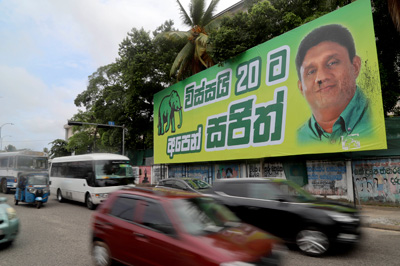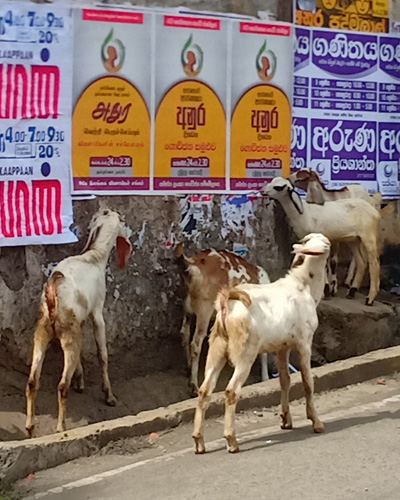News
National Election Commission to act tough on propaganda material
The National Election Commission (NEC) said last week that structures set up on roads and public places by political parties advertising their candidates will be stripped off once nominations for the presidential election closes next week.
Additional Director Saman Ratnayake said from October 8 all posters, hoardings and cutouts will be removed in keeping with the election law.
He said although the law stipulates that political parties should refrain from displaying huge structures that inconvenience the public, since huge hoardings and posters displaying candidates has become part and parcel of Sri Lanka’s political culture the NEC as made concessions to allow them until October 7.
He added that NEC will set up an election dispute resolution unit in each Government Agent division where complaints with regard to illegal advertising structures will be entertained. The office will also receive complaints of violence and election fraud.
Police personnel who will be attached to the special unit will act on the complaints and remove cut outs, bill boards and hoardings displayed at unauthorised sites. In authorized sites the NEC has set out guidelines for such structures and those that do not conform will be removed. Bill boards, hoardings and cutouts can be setup inside party offices. However structures on the main roads or roads leading to party offices will not be allowed. Only posters announcing the date venue and time of political meetings will be entertained.
The NEC will also monitor social media that could be used to promote candidates and incite hate speech. The NEC has held talks with the Telecommunication Regulatory Commission (TRC) to regulate any hate speech on Whatsapp and Face book.
National Polls Observation centre (NPOC) said they will focus on monitoring misuse of the social media, state resuources. Executive Director, Rasanga Harischandra said that NPOC along with the NEC is discussing with an Indian team regarding this issue.
Election monitor People’s Action for Free and Fair elections (PAFFREL) said it would focus mainly on the misuse of state resources for election propaganda. Executive Director, Rohana Hettiarchi said they have written to all secretaries of local government bodiesand the Ministry of Public Administration which has jurisdiction over the ministries, to have control on the distribution of public sector jobs to party supporters. The organisation has also asked for details of government vehicles in ministries so that they could have a tab on whether they are being used for propaganda purposes.
The NEC has also laid down rules about minimising the number of people involved in house to house campaigning.
Regarding the deployment of foreign election monitors during the elections, Mr. Ratnayake said that local monitoring bodies including PAFFREL and CMEV could include foreign members in their quota to observe the polling booths.
“We Sri Lankans are not allowed to participate in election monitoring in other countries and moreover foreign observers do not know the system here and view the process with a different mindset. The fact that Sri Lanka is a third world country makes them class our democratic process with other fledgling democracies in the African continent,,” he said.
“Also they compare the process with elections in other developed countries that have electronic voting systems,” he added.

Pix by Priyantha Wickramaarachchi, Ishanka Sunimal and Palitha Ariyawansa
The NEC will be inviting countries in the European Union and the Common Wealth to observe the election process. However, when writing reports regarding the election the observers would have to discuss the potential content with the National Election Commission.
PAFFREl will deploy 14,000 observers to polling stations across the country. It also plans to assign one personnel each to the 160 electorates in the country.
The NPOC plans to deploy around 2000 observers covering the 22 electoral districts on election day.
In addition, all poll monitoring bodies have requested candidates to have an environmentally friendly campaign by avoiding the use of polythene and plastic for decor during rallies.

